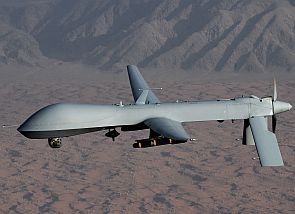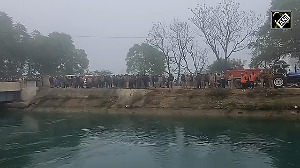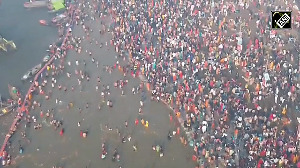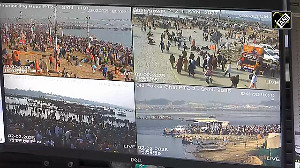 Drones may have been used for non-lethal purposes but state-sponsored assassinations and semi-covert wars are fuelling their boom and not scientific missions or creative activists, says American political activist Medea Benjamin.
Drones may have been used for non-lethal purposes but state-sponsored assassinations and semi-covert wars are fuelling their boom and not scientific missions or creative activists, says American political activist Medea Benjamin.
In her book Drone Warfare: Killing by Remote Control, the co-founder of the peace group CODEPINK and the international human rights organisation Global Exchange delves into the new warfare system affecting the Indian subcontinent, especially Pakistan and Afghanistan.
"Drone Warfare" looks at the growing menace of robotic warfare, with an extensive analysis of who is producing the drones, where they are being used, who 'pilots' these unmanned planes, who are the victims, and what are the legal and moral implications.
It also looks at what activists, lawyers and scientists are doing to ground the drones, and ways to move forward.
"In reality," writes Benjamin, "the assassinations the US is carrying out via drones will come back to haunt it when others start doing the same thing -- to the Americans."
Opposing the use of drones, she writes, "We need a vigorous debate and activism around a technology like drones that has a profound impact on our reputation, the ethical foundations of our society, the lives of innocent people, and ultimately, our security as a nation."
Though she feels not all uses of unmanned aircraft are bad, she adds "but what are fuelling the drone boom are neither scientific missions nor creative activists, but state-sponsored assassinations and semi-covert wars".
"And unfortunately, it is those latter pursuits -- not a cure for cancer, say, or replacement for fossil fuels -- to which some of the best scientific minds in the world today are dedicating their time."
Environmental, human rights and even protest groups are starting to use drones. Drones were used after the earthquake in Japan to observe radiation levels at the Fukushima nuclear plant.
They were used in Australia to inspect the state of wildlife after a massive flood. They have great potential to help firefighters by hovering over swaths of burning forests.
Benjamim, however, says that drones now under development in research centres all over the country are designed to be more lethal, have greater autonomy, stay airborne for longer periods and have a more precise, broader vision of the battlefield.
"One technology under development is termed the 'swarm'. Like a swarm of angry bees, a bevy of unmanned aerial, ground and sea vehicles would autonomously converge on enemy troops, aircraft and ship. Then they’d jointly decide their plan of attack, engage the enemy -- all without direct human intervention," says the book, published by HarperCollins.
Weeks after the 2002 American invasion of Afghanistan, Benjamin visited that country. There, on the ground, talking with victims of the strikes, she learned the reality behind the 'precision bombs' on which US forces were becoming increasingly reliant.
With the use of drones escalating at a meteoric pace, Benjamin has written this book as a call to action: "It is meant to wake a sleeping public," she writes, "lulled into thinking that drones are good, that targeted killings are making us safer."
Benjamin says drones don't revolutionise surveillance, they are a "progressive evolution" in making spying, at home and abroad, more pervasive.
"Drones don’t revolutionise warfare; they are, rather, a progressive evolution in making murder clean and easy. That's why the increased reliance on drones for killing and spying is not to be praised, but refuted. And challenged," she suggests.
According to Benjamin, the surveillance capabilities of drones and their increasing use by domestic law enforcement agencies in the US and elsewhere threaten to eviscerate what’s left of our privacy rights.
"The sensors on drones are designed to monitor miles of terrain. No matter how targeted an investigation, you always risk the prying eye of the state observing your affairs," she writes.







 © 2025
© 2025